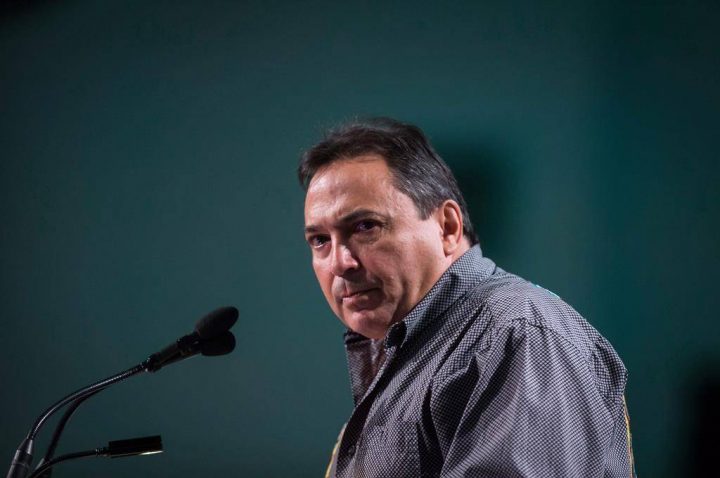Canada has been treating Indigenous issues as higher priorities since the last federal election but more work needs to be done, says Assembly of First Nations Chief Perry Bellegarde.

The national group, which includes First Nations chiefs from across Canada, is outlining its election priorities for Canada’s First Nations, with less than a week before the federal campaign must begin.
READ MORE: AFN chief says Canadians are divided on pipelines, energy policy
Bellegarde released a 16-page document today in Ottawa, saying he hopes it will frame the dialogue around First Nations during the election race and help set the agenda for Indigenous rights and priorities for the next government.
“Has the gap closed yet? The answer is no. Has there been movement? The answer is yes, but we have to maintain momentum,” he told reporters.
WATCH BELOW: Indigenous families given $2B payout for children separated from parents by government

Neither Bellegarde nor the AFN is endorsing a particular political party for the Oct. 21 vote. Rather, the hope is to motivate Indigenous Canadians to exercise their right to vote and, when they do, to examine the progress that has been made by all parties on making First Nations issues a priority, Bellegarde said.
“I think we can have an impact, no question.”
The AFN election document, entitled “Honouring Promises,” lists short and long-term goals to improve the lives of Indigenous peoples in Canada.
READ MORE: Concrete action must be the legacy of MMIWG report, Indigenous advocates urge
The top priority is mitigating the effects of climate change. It calls on the incoming federal government, within the first year of its mandate, to work with First Nations to make climate change a national priority.
The AFN wants First Nations to become full partners in carrying out Canada’s climate plan, including in any decisions on how to spend money raised from carbon pricing, and would like direct participation in federal environmental policy-making.

Get breaking National news
“For generations we have heard promises. Now we must see action, in partnership with Indigenous knowledge,” the document says.
“We must develop a vision of environmental stewardship that is global and holistic, taking us beyond existing targets and timelines, toward a sustainable future for all generations.”
The national group is also looking for recognition that First Nations’ treaty rights would allow them to develop and implement environmental regulations and impact-assessment regimes.
WATCH BELOW: Court rules 6 Trans Mountain pipeline legal challenges allowed to proceed

A number of First Nations have mounted legal challenges against the federal government on major energy projects, including the Trans Mountain pipeline, on grounds of not having been properly consulted — some of which have been successful.
The AFN is now asking for the federal government to support First Nations-led environmental and regulatory reviews as part of a more collaborative approach to environmental stewardship.
This 2019 election document builds on the AFN’s “Closing the Gap” document, distributed to each party during the last federal election. Bellegarde says he is confident his organization was able to influence the policies of political parties in 2015 and hopes to do so again this time.
“Concrete actions” and investments have been made, Bellegarde acknowledges, while stressing the “considerable ground to make up to ensure First Nations and Canadians share an equal quality of life, and to see generational shifts in outcomes.”
Another area where “sweeping changes” are needed is in the overrepresentation of Indigenous peoples in the criminal-justice system and in jails and prisons in Canada, the AFN says.
READ MORE: First Nations’ candidates claim election interference by federal government
In 2017-18, Indigenous inmates represented 28 per cent of the total number of federal prisoners, despite making up just 4.3 per cent of the total Canadian population, according to the annual report of the federal correctional investigator.
The situation for Indigenous women is particularly striking — over the last 10 years, the number of Indigenous women sentenced to more than two years in prison increased by 60 per cent, and they now are 40 per cent of incarcerated women in Canada.
The AFN is calling for new restorative-justice systems to promote community healing, reconciliation and reintegration, displacing punitive measures.
WATCH BELOW: First Nations members honour wrongfully executed chief

The group also notes the role of judges, asking for First Nations appointees at all levels of courts, “particularly the appointment of the first First Nations Supreme Court justice.”
According to data published by the office of the Commissioner for Federal Judicial Affairs, which manages appointments of judges to Canada’s superior courts, of the 629 candidates assessed for judicial appointments between October 2017 and October 2018, only 23 identified as Indigenous and, ultimately, only three out of 79 total candidates appointed were Indigenous.
The AFN is also calling for more economic-development opportunities for First Nations, including better entrepreneur programs for First Nations women and youth, as well as a First Nations infrastructure bank.
Better access to safe drinking water and greater investments in housing, health care, education and high-speed Internet are also ongoing top priorities for First Nations across Canada with many suggested actions for improvement.
Canada has made commitments to First Nations people, and a key part of reconciliation is honouring promises, the election priorities document says, explaining its chosen title.
“This plan we call ‘Honouring Promises’ points the way to real, transformative change. The time to act is now.”
A total of 61.5 per cent of eligible First Nations voters cast ballots in 2015 — a number Bellegarde hopes will grow to ensure Indigenous issues are top-of-mind for political parties as they make their pitches to voters on the hustings over the coming weeks.







Comments